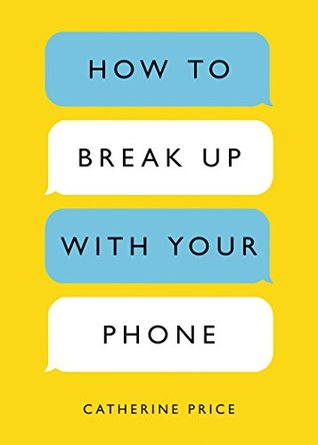How to Break Up With Your Phone. 1/100
Перша прочитана книга цього року.
Книга про те як і чому нам варто переглянути свої відносини зі смартфонами та соцмережами. Про допамін та кортизол, виділення, яких стимулюється сповіщеннями та алгоритмами соцмереж.
Вона не про повну відмову від девайсів, а, швидше, про свідоме користування та споживання інформації.

======
В середньому я використовую Інстаграм та Фейсбук одну годину на день. Це 365 годин на рік. За 365 годин можна прочитати 73 книги (по 5 годин), вивчити нову мову, опанувати 18 нових навичок (якщо вірити Джошу Кауфману та книзі «Firts 20 Hours. How to Learn Anything Fast»).
Тож план на цей рік: вчергове зменшити вплив смартфона та соцмереж на життя, психологічний стан та емоції. Та повернути собі хоча б 300 годин із 365.
Трохи цитат з книги:
«Nearly 1 out of every 10 American adults admits to checking their phone during sex»
«Spending extended time on them has the power to change both the structure and the function of our brains—including our abilities to form new memories, think deeply, focus, and absorb and remember what we read»
«Multiple studies have associated the heavy use of smartphones (especially when used for social media) with negative effects on neuroticism, self-esteem, impulsivity, empathy, self-identity, and self-image, as well as with sleep problems, anxiety, stress, and depression»
«The point is that many of the same feel-good brain chemicals and reward loops that drive addictions are also released and activated when we check our phones»
«Want to know another device that uses intermittent rewards to drive compulsive behavior? Slot machines. In fact, the similarities between the two devices are so powerful that Harris frequently compares smartphones to slot machines that we keep in our pockets. “When we pull our phone out of our pocket, we’re playing a slot machine to see what notifications we got,” he explained in an article titled “How Technology Is Hijacking Your Mind.”»
«Designers know that humans have an intrinsic desire for affirmation, and that the more ways there are for us to be judged, the more compulsively we’ll monitor our score. In Irresistible, Adam Alter describes the launch of the “Like” button on Facebook as having had a psychological effect that was “hard to exaggerate.” As he puts it, “A post with zero likes wasn’t just privately painful, but also a kind of public condemnation.”»
«Let’s start with a question: have you ever wondered why social media apps are all free? It’s not because their creators are driven by a philanthropic urge to help the world share selfies. It’s because we are not actually the customers, and the social media platform itself is not the product»
«In the words of Dopamine Labs founder Ramsay Brown, “You don’t pay for Facebook. Advertisers pay for Facebook. You get to use it for free because your eyeballs are what’s being sold there.”»
«…a New York Times analysis calculated that as of 2014, Facebook users were spending a collective 39,757 years’ worth of attention on the site, every single day. It’s attention that we didn’t spend on our families, or our friends, or ourselves. And just like time, once we’ve spent attention, we can never get it back.»
«This is a really big deal, because our attention is the most valuable thing we have. We experience only what we pay attention to. We remember only what we pay attention to. When we decide what to pay attention to in the moment, we are making a broader decision about how we want to spend our lives»
«Imagine that someone knocked on your door and asked you to register the following information with the government: your full name, birth date, phone number, email address, physical address, education and work history, relationship status, names and photographs of all family members and friends, photographs and videos of yourself for as far back in time as possible, your political leanings, your travel history, your favorite books, your favorite music, and your favorite, well, everything. Would you?»
«The result is that, the more we read online, the more we teach our brains to skim. This can be a useful skill to hone, especially when we’re constantly faced with such information overload. But it becomes a problem if skimming becomes our default—because the better we become at skimming, the worse we get at reading and thinking more deeply. And the harder it is for us to focus on just one thing»
«In fact, whereas short-term memories are generally created by strengthening the connection between neural circuits, creating long-term memories requires your brain to actually create new proteins»
«IN THE PAST, if a person described herself as feeling happy, sad, excited, anxious, curious, frustrated, ignored, important, lonely, joyful, and existentially depressed within the space of five minutes, she likely would have received a diagnosis. But give me five minutes on my phone, and I can accomplish this and more. Our phones are like Pandora’s boxes of emotions—and every time we check them, we open ourselves up to an unpleasant surprise»
«Every ding and vibration from our phones triggers chemical reactions in our brains that pull us away from what we are doing—or the person we are with—and compel us to check our phones, usually for someone else’s benefit. Push notifications turn our phones into slot machines, and reinforce the very habit loops that we are trying to change. They are evil and must be destroyed»
«Checking your phone is like picking your nose: there’s nothing wrong with it, but no one should have to watch you do it»
«Whenever you notice that you’re itching to check something—email, social media, text messages, the news, whatever—ask yourself some simple questions: What’s the best thing that could happen as a result of your checking? What’s the best email you could receive? The best piece of news? The best notification? What’s the best emotion that you could experience?»

Залишити відповідь